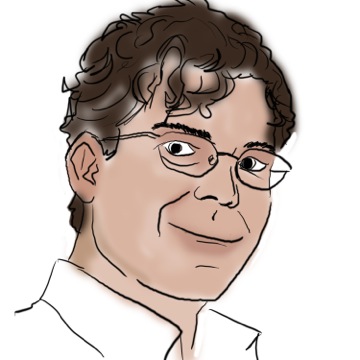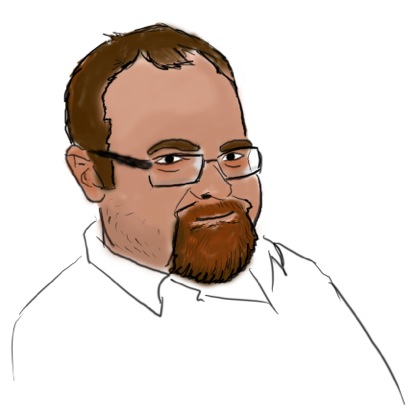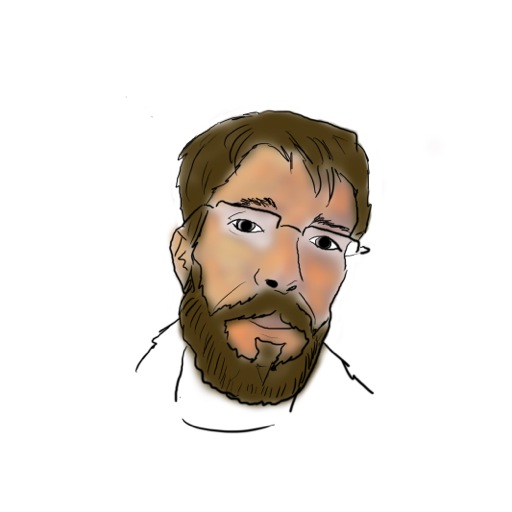There’s a place in the cultural conversation for both friars and fools, for those who discern truth through contemplation and prayer, as well as those who seek to reveal it through satire and silliness. But it’s not every day that both come together for substantive (if not always serious) theological conversation.
Aric Clark, Nick Larson, and Doug Hagler, also known online as Two Friars and a Fool, host such conversations on their blog and podcast about theology and spiritual practice, sexuality, and popular culture. They recently combined forces as well for their first book, Never Pray Again: Lift Your Head, Unfold Your Hands and Get to Work . The intentionally provocative title emphasizes the need for Christians to get outside of our own heads and churches, and about the business of being the hands and feet of Jesus in a world in need.
I chatted with the trio recently about their new project, as well as the “Never Pray Again” coloring book, which they crowd funded through a recently successful Kickstarter campaign.
Q: Do you pray?
A: Yes — of the three of us, Nick probably prays the most, but we are all pastors, and we all pray with and for people, in worship, when we visit people at home, or in the hospital or in prison. There are plenty of situations where it would be “tone-deaf” (to quote a recent review of the book) to simply refuse to pray. In many cases, that is the strong expectation, and that is one way that people will feel comforted and cared for and listened to. But there’s nothing special about prayer in that regard. There are many ways that people can feel comforted, cared for, and listened to. There are other ways to articulate feelings and needs and compassion. For the foreseeable future, however, prayer is probably inescapable as a language of faith.
Q: Is all prayer wasted time? Is there any kind of prayer you think is valuable?
A: Not all prayer is wasted time, but prayer is rarely the best use of time. One good thing about prayer is that it is a way that people are comfortable expressing their deep longings, fears, and wounds. People will say things as part of a prayer that they would not say in conversation most of the time, and prayer can also be a time when people can hear things they would not normally hear. So prayer, in the context of people who are pray-ers, can be a good way to communicate important things.
We also often hear the claim that all things done in an attitude of prayer are themselves prayer — that prayer can be enacted, someone who sings prays twice, and so on. This makes sense, in a way, but why call those things prayer in the first place? That seems like giving prayer credit that should go to the many other spiritual disciplines out there. In Never Pray Again, we are talking about what the word “prayer” means 99.9 percent of the time — some version of eyes closed, hands clasped (or held out or whatever), saying things in one’s thoughts or aloud, alone, or in a group. What someone means when they say, “Let us pray.” That is overwhelmingly the most common Christian spiritual practice, and we think there is almost always another practice that is a better use of time and energy. Never Pray Again is about those practices.
Q: Give an example of something you recommend in place of prayer.
A: Here’s a good example that came up in a discussion with some students and staff at DePauw University. We took the example of a prayer of thanks — grace before a meal, for example. We said that what if, instead of saying grace, thanking God for the meal, we instead thanked the people around us for joining us, and thanked the people who prepared and served our meal? Two of us Friars have worked in food service, and I think many people have had some experience of retail or the service industry, and we can all attest to the fact that it is literally thankless work. If you hear from a customer, it is almost always to be scolded or reprimanded or pulled into an argument.
 During the conversation, we took a moment to give an immediate example. We thanked everyone for joining us for the conversation, and we thanked the Director of the Center for Spiritual Life for hosting us. We thanked the student intern who organized the events, and who wrote the grant application that made it possible to reimburse us for our travel expenses. In the moment, this felt much more powerful than if we had paused to thank God for those things. I mean, the people we needed to thank were right there. So we thanked them. And in doing so God was not left out of the process; in fact God is thanked.
During the conversation, we took a moment to give an immediate example. We thanked everyone for joining us for the conversation, and we thanked the Director of the Center for Spiritual Life for hosting us. We thanked the student intern who organized the events, and who wrote the grant application that made it possible to reimburse us for our travel expenses. In the moment, this felt much more powerful than if we had paused to thank God for those things. I mean, the people we needed to thank were right there. So we thanked them. And in doing so God was not left out of the process; in fact God is thanked.
Q: Did all of your ideas make into the book? Was there anything that you had to leave out?
A: In the process of writing we were always adding and changing content. We even have a file called "the cutting room floor." It contains lots of great material that did not make it into the final manuscript. We cut a whole chapter that was in our original brainstorming list on blessing. Bless! eventually was pulled because it felt like it overlapped too much with Thank!
Yet the story that I wish made the final cut is about one of our patron saints around Two Friars and a Fool, Mr. Rogers. To us he was a man who embodied blessing. He blessed in both word and action everyone who came into contact with him. We wanted to use the story about the time that he testified before Congress about the blessing of the kinds of programming available on Public Broadcasting when funding was going to be cut. His quiet gentleness not only secured the funding but got Congress to increase the budget for PBS so that he could continue to bless another generation. Which happens to have been our generation.
As you know from the writing process sometimes you end up leaving really great stuff on the cutting room floor. Yet this also contributes to the collection of illustrations and clips we use when we are invited to speak about the book.
Q: Has anyone's reactions surprised you?
A: We have been starting to have a lot of good discussion around the book, and perhaps the most surprising range from serious prayer practitioners to friendly atheists. So far it seems that it is getting reactions from a wide range of places.
Last week, for example, Doug expanded on some of the ideas from the book on a post titled "Other People's Magical Experiences." We've had some great exchanges with the community over at Friendly Atheist about our shared doubts regarding the efficacy of prayer.
At the other end of the spectrum there is a man we know who quotes regularly from every book with the word prayer in the title and he really enjoyed the book too. There was a lot of back and forth but he particularly loved the practical experiments for action that conclude each chapter.
Q: Say more about these practical experiments: are they tools for social justice or just meant for personal spiritual growth?
 A: We think spiritual growth entails social justice. In our view you cannot have a good relationship with God unless you have a good relationship with your neighbor.
A: We think spiritual growth entails social justice. In our view you cannot have a good relationship with God unless you have a good relationship with your neighbor.
So for example a favorite experiment comes from our Beg! chapter where we challenge the reader to commit for a period of time to giving to anyone who asks for assistance from them. This challenge spurred from conversation among us and we've been trying to practice this for a while now. We've discovered that you can't always give them exactly what they come to you for, but we can take concrete steps to address their need. This has led us to rethinking how we respond to needs in our communities, from strangers on the street, to exceptionally needy parishioners.
Q: Is there any reaction you haven't gotten yet that you are still hoping for?
A: Honestly, we are pretty disappointed that Driscoll or Piper hasn't given us a farewell tweet. ;)
Christian Piatt is a Sojourners Featured Writer and an author, editor, speaker, musician, and spoken word artist. He is director of church growth and development at First Christian Church in Portland, Ore. Christian is the creator and editor of Banned Questions About The Bible and Banned Questions About Jesus. His memoir on faith, family and parenting is called PREGMANCY: A Dad, a Little Dude and a Due Date.
Got something to say about what you're reading? We value your feedback!
